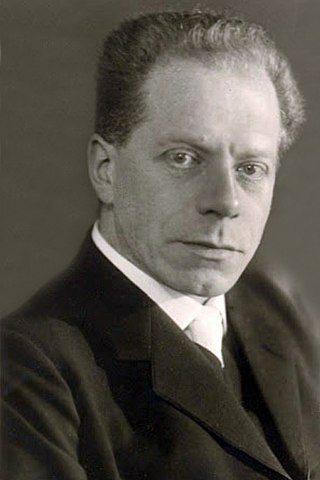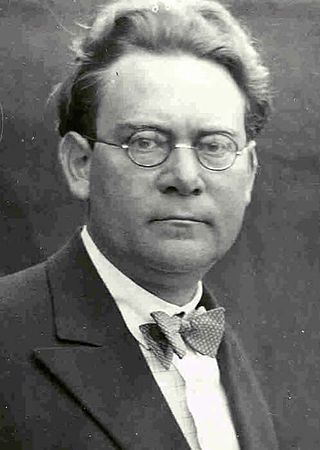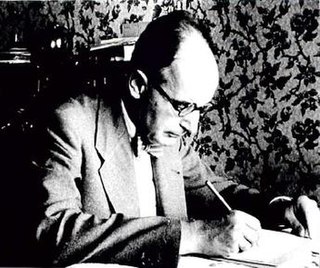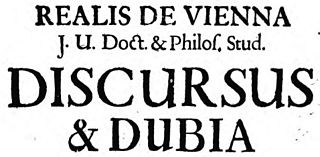Related Research Articles
1908 (MCMVIII) was a leap year starting on Wednesday of the Gregorian calendar and a leap year starting on Tuesday of the Julian calendar, the 1908th year of the Common Era (CE) and Anno Domini (AD) designations, the 908th year of the 2nd millennium, the 8th year of the 20th century, and the 9th year of the 1900s decade. As of the start of 1908, the Gregorian calendar was 13 days ahead of the Julian calendar, which remained in localized use until 1923.
The Grelling–Nelson paradox arises from the question of whether the term "non-self-descriptive" is self-descriptive. It was formulated in 1908 by Kurt Grelling and Leonard Nelson, and is sometimes mistakenly attributed to the German philosopher and mathematician Hermann Weyl thus occasionally called Weyl's paradox or Grelling's paradox. It is closely related to several other well-known paradoxes, in particular, the barber paradox and Russell's paradox. It is an antinomy, or a semantic self-referential paradox.
This is a list of music-related events in 1800.

Leonard Nelson, sometimes spelt Leonhard, was a German mathematician, critical philosopher, and socialist. He was part of the neo-Friesian school of neo-Kantianism and a friend of the mathematician David Hilbert. He devised the Grelling–Nelson paradox in 1908 and the related idea of autological words with Kurt Grelling.
In logic and philosophy, a property is a characteristic of an object; a red object is said to have the property of redness. The property may be considered a form of object in its own right, able to possess other properties. A property, however, differs from individual objects in that it may be instantiated, and often in more than one object. It differs from the logical/mathematical concept of class by not having any concept of extensionality, and from the philosophical concept of class in that a property is considered to be distinct from the objects which possess it. Understanding how different individual entities can in some sense have some of the same properties is the basis of the problem of universals.

Mike Grell is an American comic book writer and artist, known for his work on books such as Green Lantern/Green Arrow, The Warlord, and Jon Sable Freelance.
An autological word expresses a property that it also possesses. For example the word "pentasyllabic" has five syllables, and the word "writable" is writable.

Hans Reichenbach was a leading philosopher of science, educator, and proponent of logical empiricism. He was influential in the areas of science, education, and of logical empiricism. He founded the Gesellschaft für empirische Philosophie in Berlin in 1928, also known as the "Berlin Circle". Carl Gustav Hempel, Richard von Mises, David Hilbert and Kurt Grelling all became members of the Berlin Circle.
The Berlin Circle was a group that maintained logical empiricist views about philosophy.

Kurt Grelling was a German logician and philosopher, member of the Berlin Circle.

Lords of Madness is an official supplement for the 3.5 edition of the Dungeons & Dragons fantasy roleplaying game.
Events from the year 1949 in France.
Events from the year 1961 in France.
Events from the year 1846 in France.

Atheism, as defined by the entry in Diderot and d'Alembert's Encyclopédie, is "the opinion of those who deny the existence of a God in the world. The simple ignorance of God doesn't constitute atheism. To be charged with the odious title of atheism one must have the notion of God and reject it." In the period of the Enlightenment, avowed and open atheism was made possible by the advance of religious toleration, but was also far from encouraged.
This is a list of articles in analytic philosophy.

Louis Frederick Grell was an American figure composition and portrait artist based in the Tree Studio resident artist colony in Chicago, Illinois. He received his formal training in Europe from 1900 through 1915 and later became art professor at the Chicago Academy of Fine Arts from 1916 to 1922, and at the Art Institute of Chicago from 1922 to 1934. Grell exhibited his works throughout Europe from 1905 to 1915, in San Francisco in 1907, and in Chicago at the Art Institute 25 times from 1917 to 1941. He exhibited in New York in 1915 and 1916 and in Philadelphia and Washington DC. Primarily an allegorical and figurative composition muralist and portrait painter, his creative strokes adorn the ceilings and walls of numerous US National Historic Landmark buildings.

Gabriel Wagner was a radical German philosopher and materialist who wrote under the nom-de-plume Realis de Vienna. A follower of Spinoza and acquaintance of Leibniz, Wagner did not believe that the universe or bible were divine creations, and sought to extricate philosophy and science from the influence of theology. Wagner also held radical political views critical of the nobility and monarchy. After failing to establish lasting careers in cities throughout German-speaking Europe, Wagner died in or shortly after 1717.
Richard Grelling was a German lawyer, writer and pacifist who wrote the international best selling book J'Accuse in World War I, publicly criticizing the actions of Germany for waging a war of aggression in Europe.
Ellis Louis George Neville Grell was an English first-class cricketer and an officer in the Canadian, British and British Indian Army.